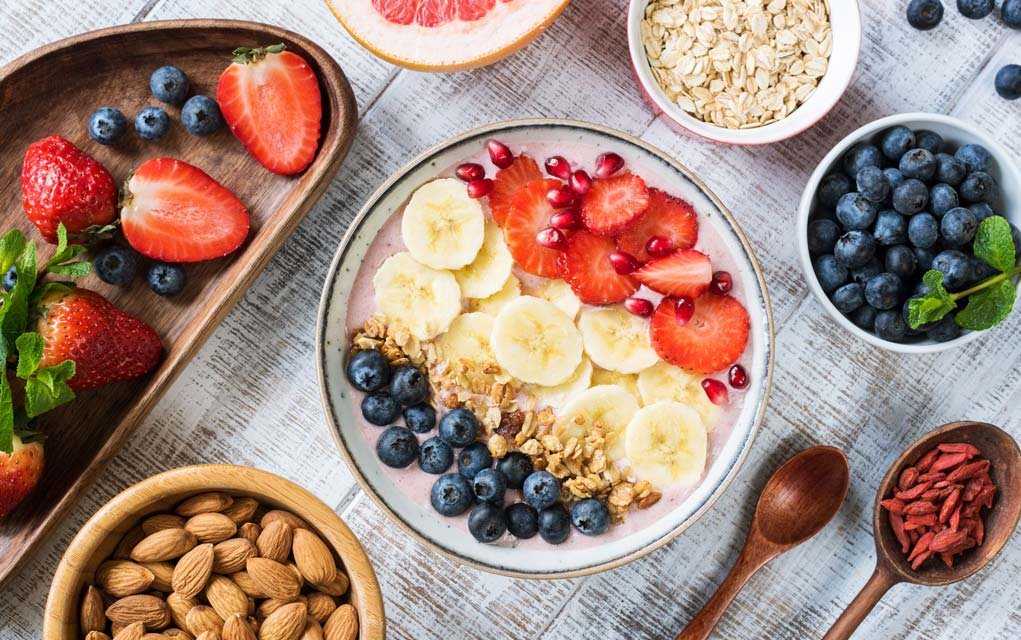You begin with the best of intentions to follow tips for healthy eating: you purchase a pressure cooker, buy quinoa and kale from the grocery store, and bookmark healthful recipes. Then something occurs. You are overburdened with a massive project at work, you have to care for ailing parents or children, or you are out all day doing errands.
For whatever reason, we often don’t have the time or energy to cook. You feel bloated and deterred from ever eating healthily again when you stop by the phone or drive-thru for a pizza. At the drive-through, a female fast food employee serves meals to a female motorist. You have good reason to be worried.
Obesity, high blood pressure, and raised blood cholesterol are all risk factors for heart disease that may result from a diet heavy in sugar, salt, and saturated fat. However, there are methods to prepare healthy meals at home without spending a lot of time grocery shopping or meal planning. When you’re on the road, you can also eat better. These techniques can help you maintain your focus even when feeling overwhelmed.
How To Accommodate A Healthy Diet In Your Busy Schedule

1. Make A Weekly Shopping Plan
Restocking your kitchen with nutritious food is one of the crucial tips for healthy eating, and one of the best ways to ensure that you always have wholesome ingredients on hand is by scheduling a regular shopping period. By setting aside time each week or biweekly to plan and shop for meals, you can prevent the temptation to rely on takeout or convenience foods when you’re tired or pressed for time.
These ready-made options are often laden with unhealthy ingredients like saturated fats, added sugars, and high levels of sodium, which can negatively impact your health over time. If finding time to shop is a challenge due to your busy schedule, consider leveraging online grocery shopping services. Many stores offer convenient home delivery options, saving you time and effort.
Additionally, you can reach out to local fruit and vegetable vendors for regular home deliveries, ensuring you always have fresh, healthy produce at your fingertips.
2. Don’t Skip Breakfast
Even though mornings can often feel rushed, it’s essential not to skip breakfast, as it provides the necessary energy and nutrients to kickstart your day. To ensure you have time for a nutritious meal, consider waking up just ten minutes earlier. This small adjustment can make a big difference in your ability to eat a balanced breakfast, whether it’s a quick smoothie, a bowl of oatmeal, or whole-grain toast with avocado.
If you find that you’re not very hungry in the morning, don’t skip it altogether. Instead, opt for something light and easy to digest, such as a banana, which provides natural sugars and potassium, or a fruit smoothie made with light milk or a dairy-free alternative.
These options are portable, quick to prepare, and can be consumed on the go. By prioritizing breakfast, you’ll set yourself up for a more productive and focused day ahead.
3. All At Once, Chop Everything
If you want to know how to eat healthy, always take the time to chop the whole onion, along with vegetables like peppers, carrots, and celery, when preparing for the week ahead. This simple step will save you valuable time during the week when you’re looking to cook a nutritious meal but are short on time.
By preparing your vegetables in advance, you can easily grab the pre-chopped ingredients and use them right away, eliminating the need to spend extra time cleaning, peeling, and chopping when you’re in a rush. This method makes preparing quick and healthy dishes like soups, stews, stir-fries, or vegetable tofu and egg scrambles much easier.
Moreover, if you end up with excess chopped onions and peppers, you can freeze them for later use. Spread them in a single layer in a freezer-safe bag and store them flat. Frozen onions and peppers make a fantastic base for soups and stews, and they hold their flavor and texture well, even after freezing. It is one of the best tips for healthy eating.
4. Make Lunch The Evening Before
To save valuable time during busy mornings, consider packing your sandwiches the night before. Preparing your lunch ahead of time not only streamlines your morning routine but also ensures you have a healthy, satisfying meal ready to go. Sandwiches made with ingredients like egg, fish, and lean meats such as chicken or turkey freeze particularly well, making it easy to prepare a week’s worth of lunches in one go.
Simply assemble your sandwiches or wraps, wrap them tightly in plastic or parchment paper, and freeze them overnight. In the morning, you can grab one straight from the freezer, and by lunchtime, it will be perfectly thawed and ready to enjoy.
This method is especially helpful when you’re short on time but still want to avoid unhealthy takeout or fast food. With minimal effort the night before, you’ll have nutritious, homemade sandwiches available all week long.
5. Prepare The Ingredients Ahead Of Time
The reason meal prep has gained so much popularity is that it’s one of the incredibly efficient tips for healthy eating during the week and eliminates the stress of preparing dinner every night. Instead of scrambling to figure out what to make each evening, meal prepping allows you to have healthy ingredients ready to go, making it easier to stick to your nutrition goals.
To keep things interesting and avoid the monotony of eating the same meals every day, try preparing individual components rather than full meals. By cooking separate items like proteins, vegetables, and carbohydrates in bulk, you give yourself the flexibility to mix and match them throughout the week.
For example, you could prepare chicken, roasted vegetables, and a carb like rice or sweet potatoes ahead of time, and then easily combine them in different combinations to create a variety of meals. This not only saves time but also keeps your meals fresh and exciting.
6. Quick Meals
Preparing a nutritious dinner in 30 minutes or less is entirely possible with the right ingredients and a little creativity. There are many quick, simple, and healthy dishes you can make, from stir-fries and salads to pasta dishes and grain bowls. To save time on prep, consider using canned or frozen vegetables, which are just as nutritious as fresh options but require far less effort to prepare.
You can skip the chopping and washing, making it easier to get dinner on the table in no time. Frozen vegetables, like peas, spinach, and mixed veggies, are particularly convenient and maintain their flavor and nutrients.
Similarly, canned vegetables like beans, tomatoes, and corn are excellent pantry staples that can be quickly incorporated into soups, stews, or casseroles. If you’re unsure of how to make the most of canned and frozen items, check out our tips for healthy buying to discover creative ways to incorporate these time-saving ingredients into your meals.
7. Arrange Your Work Area
Setting up an organized workspace in your kitchen is essential for making meal preparation less stressful and more efficient, and knowing how to eat healthy. A cluttered and disorganized kitchen can lead to increased anxiety and a sense of overwhelm, turning cooking into a daunting task.
However, the opposite is true in a tidy and well-arranged space. When your kitchen is organized, it’s much easier to find the ingredients and tools you need, helping you cook healthier meals in a fraction of the time. To improve your kitchen’s functionality, clear space on your countertop for a designated meal prep area where you can chop, mix, and cook with ease.
Store your most frequently used tools, like knives, cutting boards, and blenders, in easily accessible spots rather than hidden away in deep cabinets that require effort to reach. By making sure your workspace is optimized for efficiency, you’ll find cooking becomes a more enjoyable and manageable task. That’s one of the vital tips for healthy eating.
8. Put Your Leftovers In The Freezer
One of the best ways to save cooking time during busy weeks is by batch preparing and freezing meals in advance when you do have free time, such as on the weekend. By preparing large portions of food ahead of time, you can easily pull out a meal from the freezer on a hectic day without having to spend much time cooking.
These can then be frozen and reheated as needed, making them the perfect addition to a variety of recipes, from soups and stews to grain bowls and casseroles. This not only saves time but also ensures you have healthy, homemade options available whenever you need them.
Moreover, it’s worth exploring tips on freezing and preserving food to maintain the quality and nutritional value of your meals. This practice can dramatically reduce the stress of cooking during busy days.
Why Do You Need To Eat Healthy Even Though You Are Busy?
In today’s fast-paced world, many of us find ourselves juggling work, family, and social commitments, and looking for tips for healthy eating. With so much going on, eating healthy often takes a back seat. It’s easy to grab a quick snack, order takeout, or skip meals entirely, thinking that time is too scarce to focus on nutrition. However, maintaining a healthy diet, even during busy times, is crucial for your overall well-being.
Eating nutritious meals provides your body with the essential vitamins, minerals, and energy it needs to function at its best. When you’re busy, your body is under additional stress, and your mind requires optimal fuel to stay sharp and focused. Skipping meals or opting for unhealthy, processed foods can lead to a lack of energy, irritability, and difficulty concentrating—factors that can hinder your productivity and mental clarity.
A balanced diet can also help manage stress and improve mood. Consuming a variety of whole foods, including fruits, vegetables, lean proteins, and whole grains, supports your immune system, reduces inflammation, and stabilizes blood sugar levels, all of which are vital when your schedule is overwhelming.
Moreover, consistently choosing healthy options can prevent long-term health issues such as weight gain, diabetes, and heart disease. Even if you’re busy, taking time to eat well now can save you from health complications down the road that might require even more time and attention.
Incorporating healthy eating habits doesn’t have to be time-consuming or complicated. Simple strategies like meal prepping, keeping healthy snacks on hand, and making quick, nutritious meals can help you stay on track, even with a packed schedule. Prioritizing your health today will pay off in the long run, helping you stay energized, focused, and ready to tackle life’s demands.
FAQ
Q: How do individuals consistently eat healthily?
A: Strive for moderation, diversity, and balance. Any item may be included in a healthy diet as long as it is consumed in moderation. Eat from every food category on most days: grains, dairy, fruits and vegetables, and foods high in protein. Additionally, choose several items from every food category.
Q: How can busy individuals make healthy decisions?
A: Making healthy decisions while pressed for time requires a few essential habits. First, meal preparation and prioritization may guarantee wholesome selections are available and stop rash, unhealthy decisions. Maintaining both physical and mental function throughout the day requires drinking enough water to stay hydrated.
Q: How long does it take you to feel better after eating healthily?
A: It should come as no surprise that eating healthily can improve your general mood in as little as four weeks.











